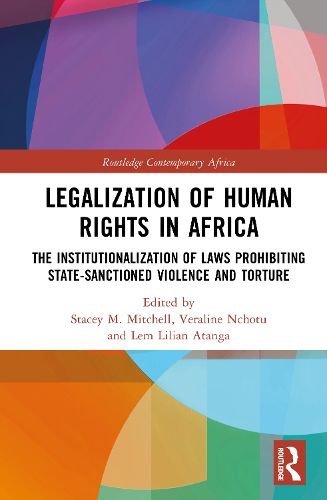Readings Newsletter
Become a Readings Member to make your shopping experience even easier.
Sign in or sign up for free!
You’re not far away from qualifying for FREE standard shipping within Australia
You’ve qualified for FREE standard shipping within Australia
The cart is loading…






Most countries on the African continent have ratified or acceded to several human rights treaties, including the Torture Convention and the African Charter on Human and People's Rights. This book assesses the progress African countries have made in institutionalizing human rights laws prohibiting torture, extrajudicial killings, and disappearances domestically.
States ratify human rights treaties for a variety of reasons. Some commentators defend an honest sincerity of purpose, whereas others might point to material incentives. The contributors to this volume go beyond the ratification puzzle to instead reframe legalization according to Lon Fuller's conceptualization of congruence. Congruence is an interactive variable that measures the continuous efforts of government and the public to shape the law and its implementation. By reframing legalization as an ongoing process, the model created by the authors is used to test several hypotheses about what impacts legalization in Africa more broadly, and in countries such as Mali, Cameroon, Botswana, Zimbabwe, and Tunisia, more specifically. The contributors to this volume demonstrate that the legalization of human rights is never a finished product, but is a moving target influenced by exogenous and endogenous phenomena.
This volume is useful for researchers of genocide, human rights, and atrocity prevention, as well as for those interested in legalization and democratization both within Africa and other regions of the world.
$9.00 standard shipping within Australia
FREE standard shipping within Australia for orders over $100.00
Express & International shipping calculated at checkout
Most countries on the African continent have ratified or acceded to several human rights treaties, including the Torture Convention and the African Charter on Human and People's Rights. This book assesses the progress African countries have made in institutionalizing human rights laws prohibiting torture, extrajudicial killings, and disappearances domestically.
States ratify human rights treaties for a variety of reasons. Some commentators defend an honest sincerity of purpose, whereas others might point to material incentives. The contributors to this volume go beyond the ratification puzzle to instead reframe legalization according to Lon Fuller's conceptualization of congruence. Congruence is an interactive variable that measures the continuous efforts of government and the public to shape the law and its implementation. By reframing legalization as an ongoing process, the model created by the authors is used to test several hypotheses about what impacts legalization in Africa more broadly, and in countries such as Mali, Cameroon, Botswana, Zimbabwe, and Tunisia, more specifically. The contributors to this volume demonstrate that the legalization of human rights is never a finished product, but is a moving target influenced by exogenous and endogenous phenomena.
This volume is useful for researchers of genocide, human rights, and atrocity prevention, as well as for those interested in legalization and democratization both within Africa and other regions of the world.